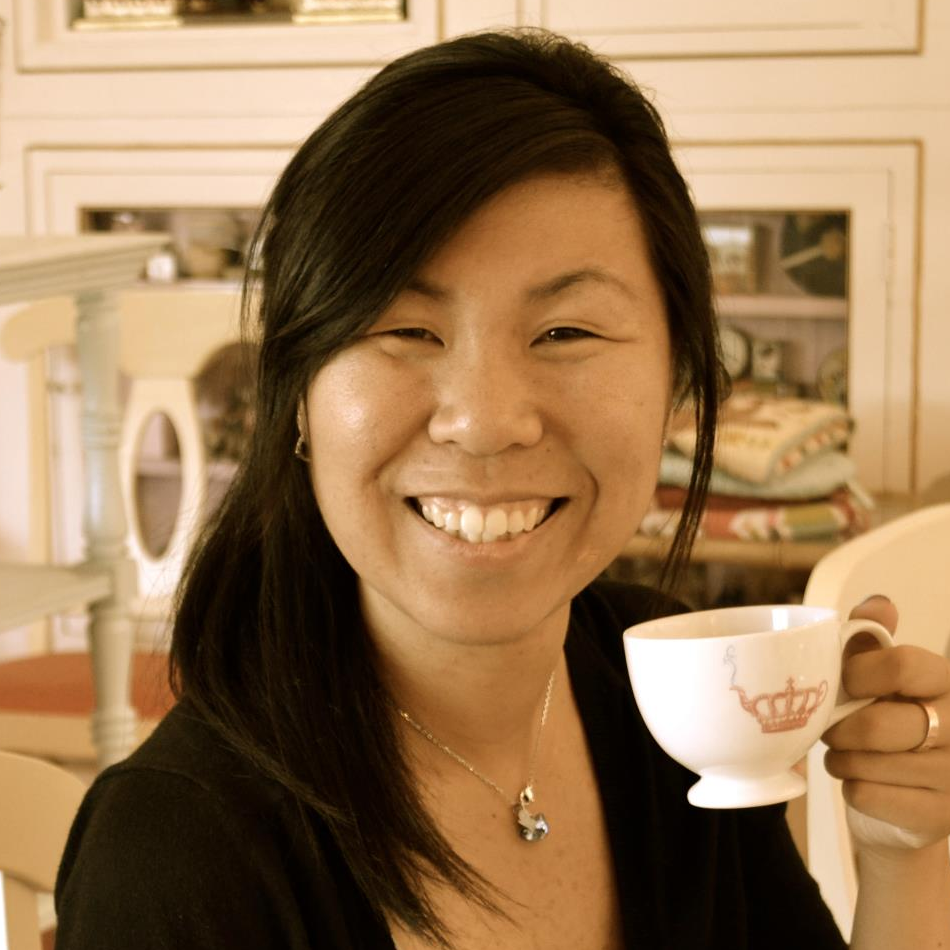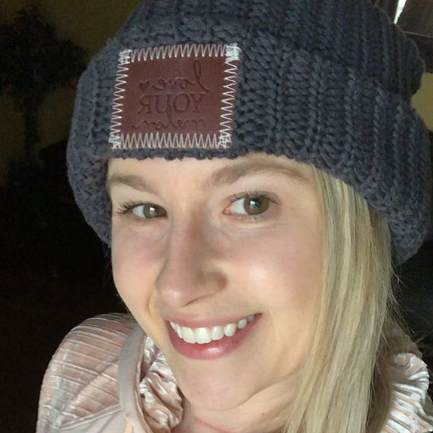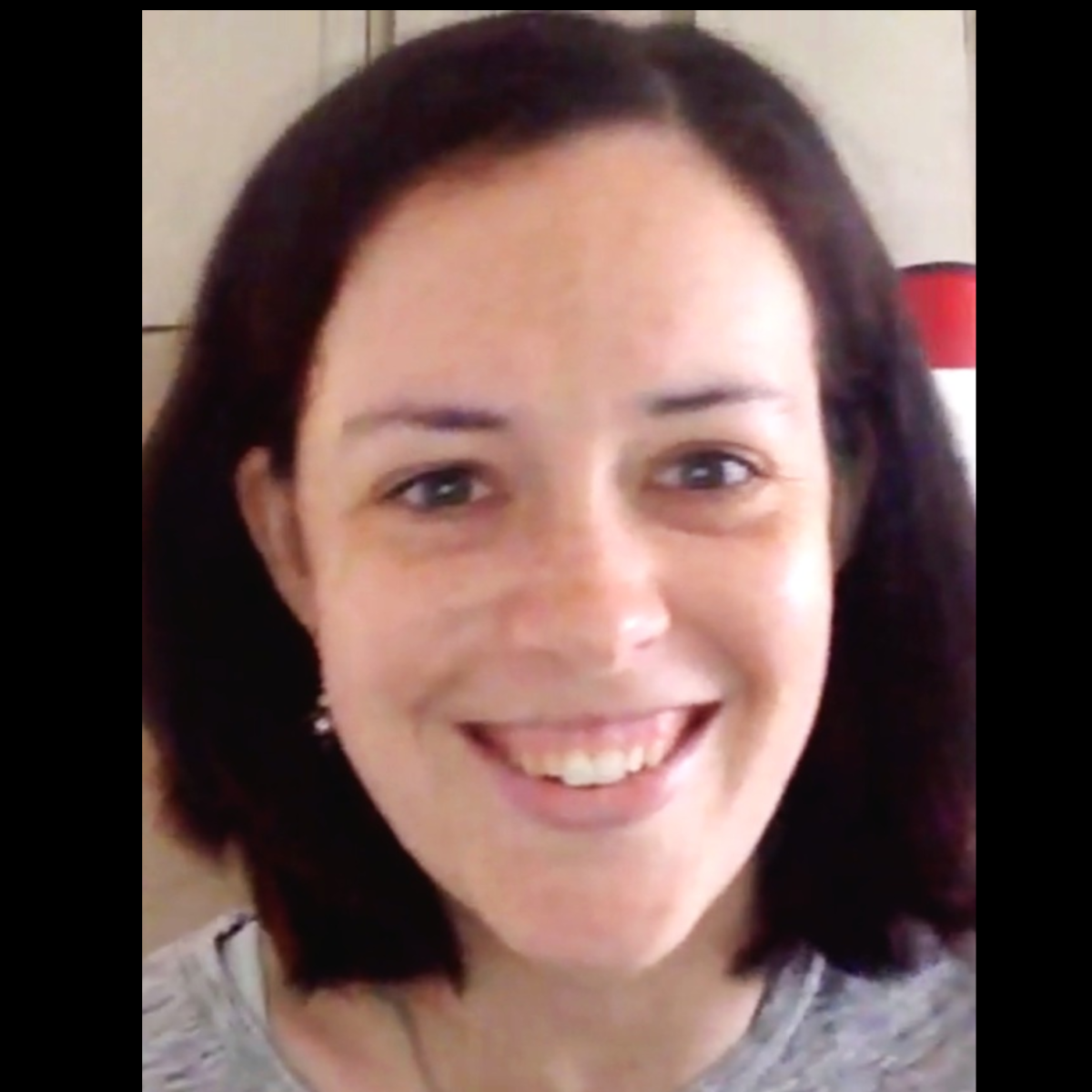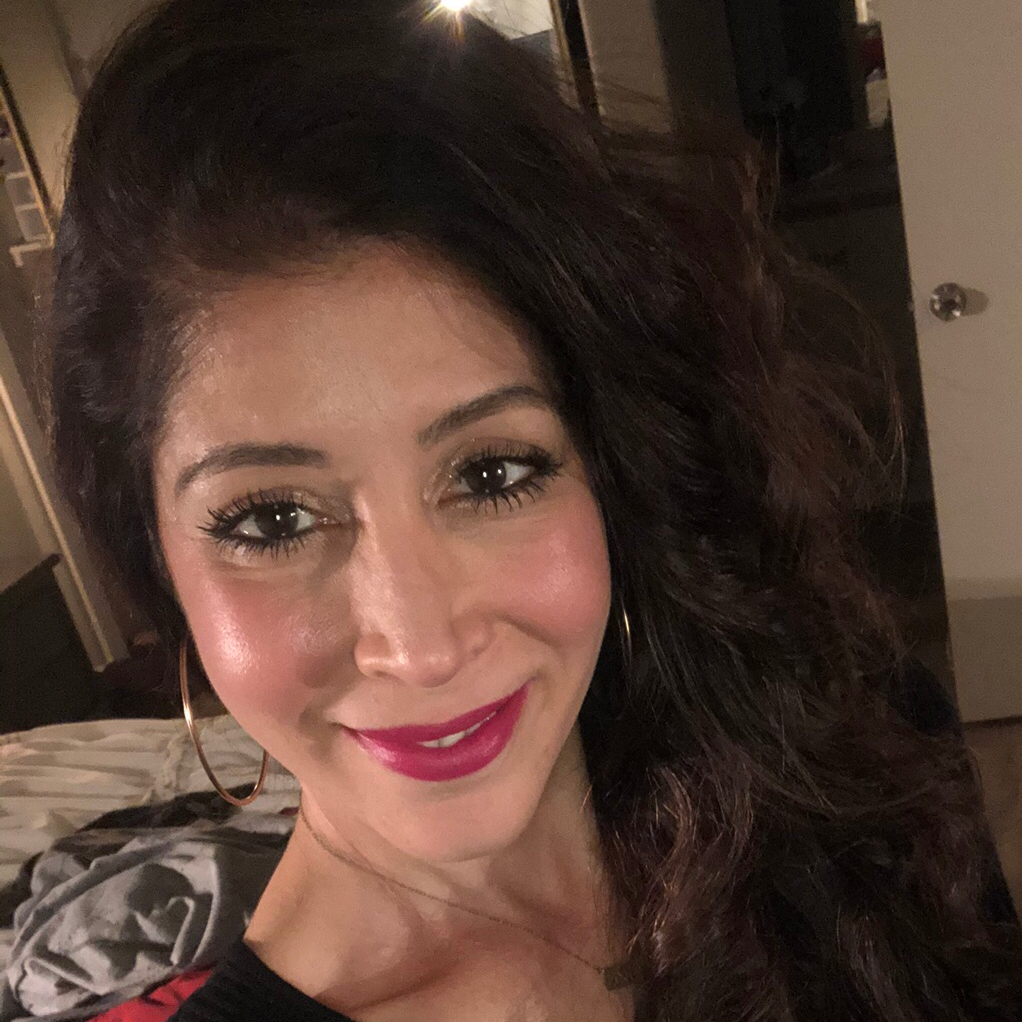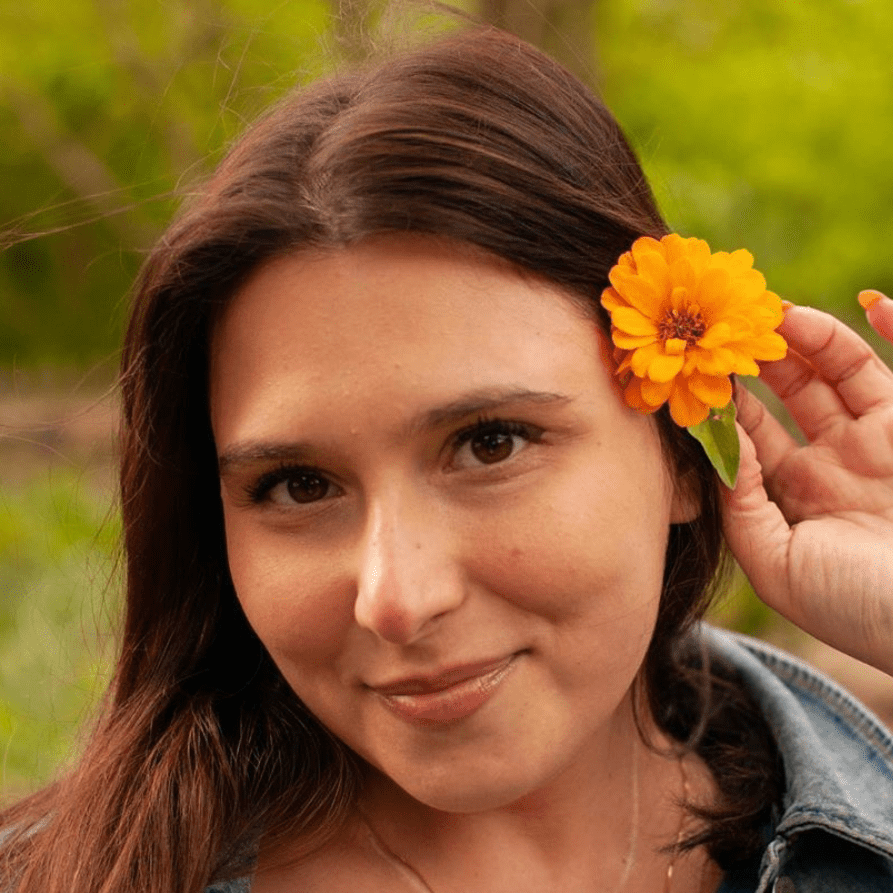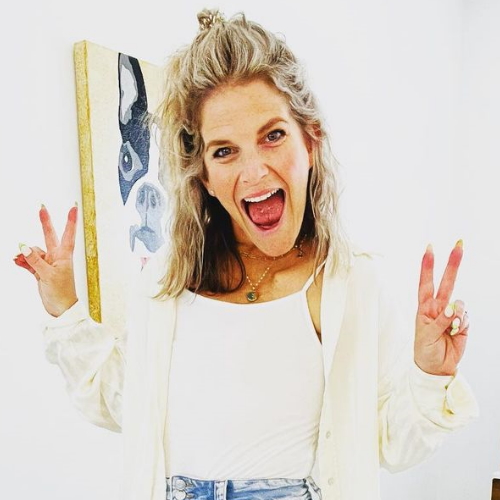Greg’s Stage 2 Metastatic Papillary Thyroid Cancer Story
Greg shares his stage 2 (metastatic) papillary thyroid cancer story and undergoing a total thyroidectomy and hormone replacement therapy (Synthroid).
In his in-depth story below, Greg highlights navigating important quality of life issues like dealing with insurance, the lack of men sharing their stories and problems, finding a cancer community, the impact of a diagnosis on a marriage and parenting, and transitioning to survivorship. Thanks, Greg!
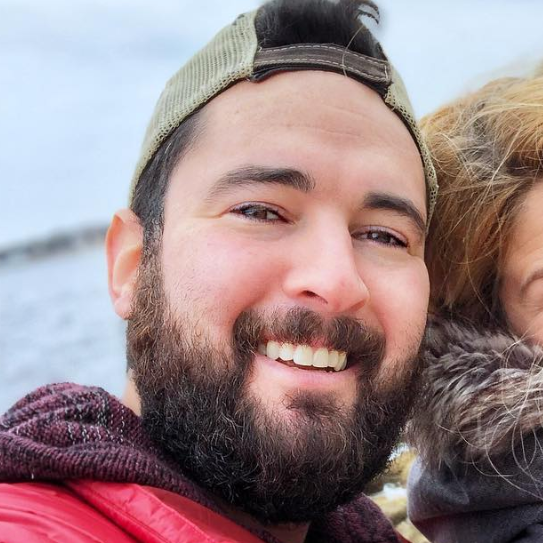
- Name: Greg S.
- Location: New Jersey
- Diagnosis:
- Papillary thyroid cancer
- Metastatic (spread to lymph nodes)
- Stage 2
- 1st Symptoms
- Fatigue
- Weight gain
- Brain fog
- Lump on neck near Adam’s apple
- Pre-treatment Tests
- Fine needle aspiration (FNA)
- Excisional biopsy (remove sample from neck area)
- Treatment
- Total Thyroidectomy
- Surgical removal of entire thyroid
- Hormone replacement therapy (Synthroid)
- Total Thyroidectomy
- Special focus:
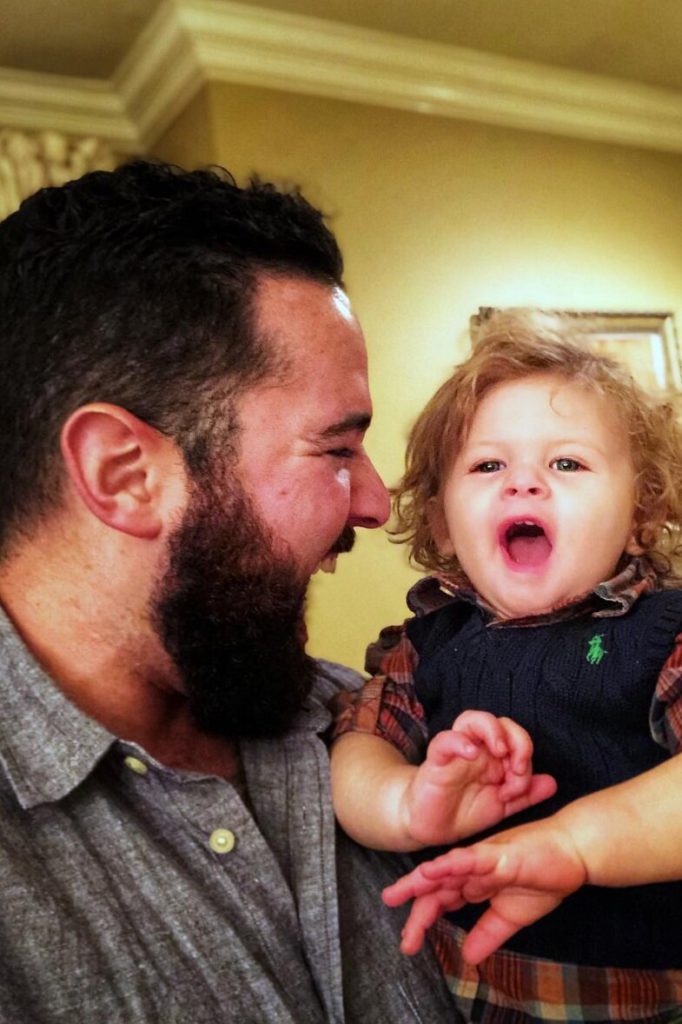
Just know that you are not alone and you are not going through this by yourself. There are people around you, people near you who love you and support you, who only want the best for you, who want to see you smile, who want to see you laugh, want to see you experience all the things that this life has to offer.
The only person that is going to take away that opportunity, the only person that’s going to stand in the way of you getting to do those things and enjoy the little things in life is you, because you have a choice, right here, right now, to decide how you’re going to deal with this.
Greg S.
- Pre-Diagnosis
- Treatment Decisions
- Getting the Diagnosis
- Describe the excisional surgery to remove the mass
- Do you remember waking up from the excisional biopsy surgery?
- Your surgeon’s bedside manner relieved a lot of your anxiety about surgery
- When did you get the official diagnosis
- How did you process the diagnosis
- How did you break the news to your loved ones
- Total Thyroidectomy
- Describe the transition going into thyroidectomy
- How did your doctor describe the total thyroidectomy and after effects
- How long between deciding to do the thyroidectomy and the actual surgery
- Describe the pre-surgery ultrasound
- What were the ultrasound results
- Describe the prep before the total thyroidectomy (surgery)
- What do you remember from waking up
- Recovery from surgery
- What were the surgery side effects
- Post-Surgery (Total Thyroidectomy)
- Describe waiting for all the test results
- How long did it take to get results from the thyroidectomy?
- What was your reaction learning the actual thyroid didn’t have cancer?
- The results (or lack thereof) were the toughest part
- The mental recovery has been tougher than the physical one
- It takes patience to get through
- How was the Synthroid?
- Pushing for More Answers
- Work & Finances
- Support & Relationships
- How did you deal with the mental and emotional stress
- It was hard to find other male thyroid cancer patients for support
- It’s important to find your “cancer community”
- How did the diagnosis impact your relationship with your partner?
- How did you tell your kids about your cancer
- Survivorship has brought its own struggles
- Last message to people dealing with a diagnosis
This interview has been edited for clarity. This is not medical advice. Please consult with your healthcare provider for treatment decisions.
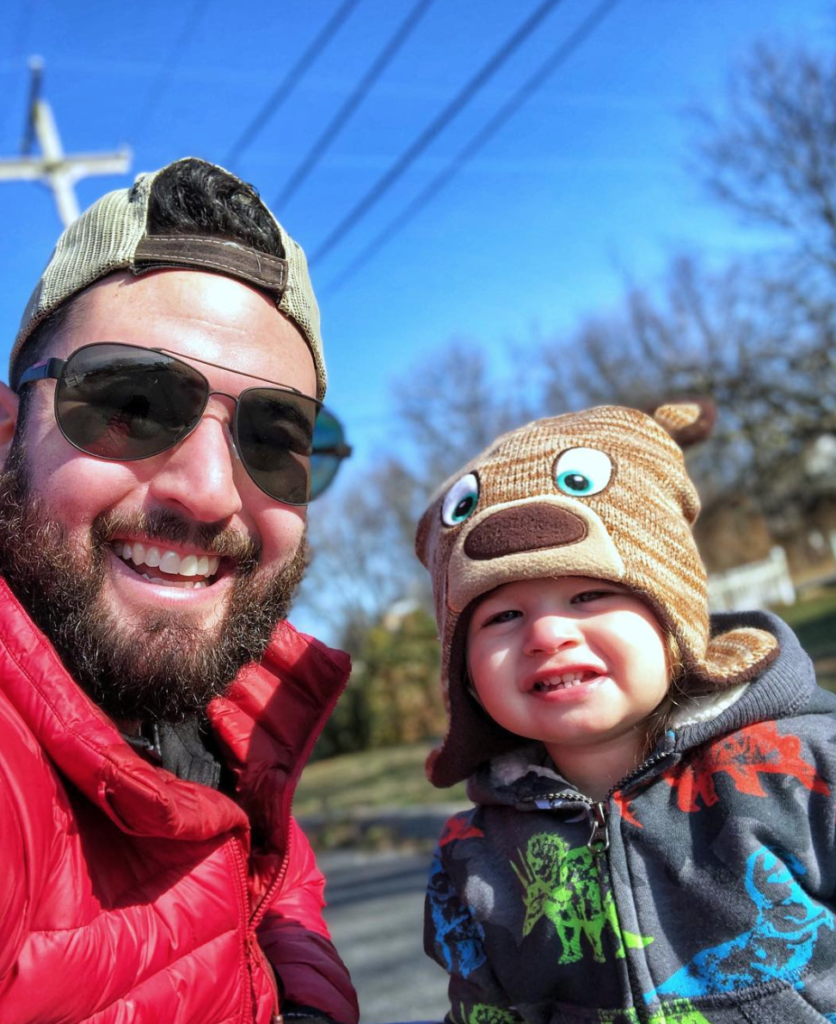
Pre-Diagnosis
What were your first symptoms
I actually didn’t know that anything was wrong. I know that sounds like a typical guy, but I really didn’t. The symptoms that I was experiencing were symptoms that perfectly mimicked themselves with eating bad.
And at the time, my son was going through that new baby phase, we just chalked up the fatigue, weight gain, brain fog, and the lack of concentration to being exhausted and tired from being up at night, because we’d both do that.
That was just the timing in my life where those things happened during new parenting moments. It’s all part of a supportive community.
That’s how we let it slip. I didn’t really experience those symptoms in any sort of way that made me think, “Oh my goodness, something is wrong,” because it didn’t seem that far out of the norm for maybe what I should have been experiencing at that time.
It was really interesting to find out down the line, and eventually get diagnosed, knowing that those symptoms had happened because I wasn’t well.
What got you to finally go to the doctor
I’ve been going through this phase for a while and in trying to get a beard line down here. You’re going to do weird things with your neck as a dude. So I’m in the mirror and I’m trying to get this line with the razor and I noticed that I had a small bump right here on the right side of my neck, just above my Adam’s apple.
I got curious. I felt it. It didn’t feel right. I’d never seen this before. So I started to ask myself some questions. My previous medical history is that I have a lot of sinus issues.
I had sinus surgery back in 2016, so my initial thought process was, “Well, maybe I’m just gone through our phase again. It’s allergies or whatever. Let me see if I get better, if it goes away. Maybe I just have a swollen gland or something like that.”
I waited about a month and it didn’t get any better. It didn’t get much bigger, but it got a little bit bigger so then I started to get concerned. I immediately consulted with my EMT and he sent me for a fine needle aspiration biopsy, which was something that I hadn’t had done before.
Naturally, I was anxious because at this point, having been in the medical field for as long as I was, lumps and bumps no matter what are never something you want so that triggered something in me at that point.
Describe the fine needle aspiration (FNA)
I had the fine needle aspiration January of 2017. I remember showing up to the office excited but nervous. I knew from past experiences with other people what type of procedure it was. It’s never something that I personally had done, but I was really just excited to hopefully find out that I was still healthy.
I remember showing up to the office,having to wait a little while, which made my anxiety [go up]. But the ENT who did it was again really fantastic. It was a good experience.
While they did the aspiration, they drained it and the ENT (ear nose throat physician) told me, “I want to see you back in four months, but if you notice anything starts to change before that then call me right away.”
Not a difficult procedure to endure, maybe a little bit uncomfortable for a couple of moments, just a little bit of light pressure. But nothing abnormal. It was really easy to go through.
I think the hardest part was just waiting for the results, and then again that not knowing. But the actual procedure itself, for anybody who has to go through the diagnosis or the process to get a diagnosis, please don’t be scared. Embrace that part of your journey.
What were the fine needle aspiration results
What came back for that was that it was non-diagnostic. They told me that within what they thought was this cyst-like structure were what they call hemosiderin laden macrophages, which I really don’t know what they are other than the excrements of red blood cells. That’s what I was looking to decipher. That didn’t tell me anything.
That was in January. In May, it had started to come back this time much more rapidly. By the time I got back to see my ENT, it was almost back to its original size.
Treatment Decisions
What were your treatment options at that point
He sat me down and gave me two options. He said they could do a repeat biopsy, but being that the first results didn’t tell them anything, he didn’t recommend it.
The doctor also mentioned having a friend at MD Anderson Cancer Center at Cooper, a head and neck cancer surgeon who specialized in these things. If there was anybody he would want me to see, it would be him and get a consultation to see what he thinks.
Right then and there, I immediately freeze, just not knowing. Here I don’t have any closure. I don’t know what it is. My ENT has sent me to a cancer specialist. What’s next?
Describe the move to the new cancer center
I ended up at MD Anderson at Cooper with an amazing surgeon. His name is Dr. Nadir Ahmad. I hope I can give him a shout out because he is the most wonderful physician I have ever encountered.
He’s an amazing person. He was amazing with my family and my experience with him was absolutely incredible. I couldn’t be more grateful for him. So thank you to him. I hope he sees this somehow, some way.
The options from Dr. Ahmad were either sit, wait, watch it, biopsy it or get the definitive explanation as to what it is and do an excisional biopsy, which totally scared me because I had to have my neck cut open.
It happened to be a very deep mass in my neck and I remember him explaining how he had to move the muscles and all that stuff. I was really nervous about the recovery so that that was hard.
Any advice on how to decide where to get treatment
Choosing where you’re going to get care is actually probably as hard as going through journey itself because you have all of these factors coming into play.
Number one, this is where being not only [a patient] but being educated consumers is really important, because you need to understand your insurance benefits.
And number two, you need to understand what qualities you’re looking for in a physician or a team of physicians. You have to be radiantly clear on that.
For me, for instance, I knew that I was looking for somebody who was going to be an active listener. I knew that I was looking for someone who had lots of experience in thyroid cancer. You have to know what questions to ask. How many cases, specifically, have you performed dealing specifically with this type of thing?
Ask those questions, get those answers because if you’re going to a surgeon who’s only done fifty of your particular case, unless it’s extremely rare, that’s not somebody I want to see.
I want to see somebody who has done this a thousand times and somebody who only does this.
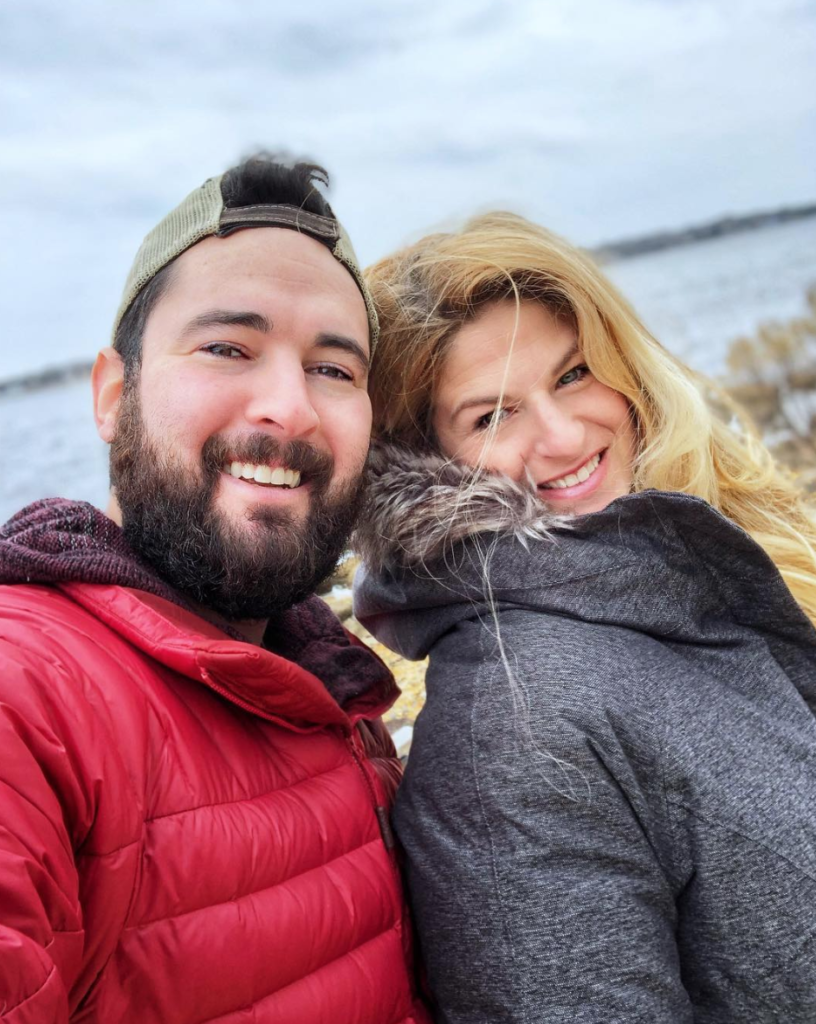
For me that’s the most important so choosing your care is going to come down to your personal preferences as to how do I want to be treated.
There’s a wide spectrum of ways to be treated in the healthcare field and that’s just a norm, so you have to be willing to test the waters, so to speak. Be willing to get multiple opinions until you find somebody who you jive with because it makes the journey easier.
I don’t want to have anxiety when I go to see a doctor. I don’t want to have angst about asking the questions and keeping the physician in the room for an extra couple of minutes.
I want somebody who is willingly spending the time in the room making sure my questions are asked, making sure my concerns are heard and making sure that my loved ones get comfortable.
In a way, that has become a lost part in medicine these days and finding people who still practice that way is how I ended up at MD Anderson at Cooper in South New Jersey.
Simply because he had the expertise, he had the care, and I’m grateful that I was able to ask the questions that needed to be asked, that I was able to find the interaction between patient and physician that I was looking for.
Being your own advocate as a patient
The most important thing is being informed and identifying the questions that you don’t have answers to because we live in a world where we have a lot of information available to us. I’m by no means recommending consulting WebMD and getting lost in that. It’s not going to serve you purpose.
But if there’s something that you don’t understand, don’t settle for not knowing. Don’t settle for, ‘I’m not a doctor, I don’t need to understand this.’ You do. You need to understand what your disease state is like, how is your disease state progressing.
How is your disease state going to affect every area of your life? You need to be informed. So if there’s something that you don’t know or something that you don’t understand, please ask the question and if the answer isn’t satisfactory to what you’re looking for, don’t be afraid to challenge it.
We’re all taught to respect people in general, but especially professionals like doctors. You can still ask them to explain that, “Well, you covered the points that I’m looking for here but I’m still not understanding this part and how it’s going to affect me here. Can we maybe take another second and revisit that with me?”
Semantics is everything and that is something that I’m learning on a daily basis, which again, is why it’s so important to know the questions that you’re going to ask and write them down. Write them down.
Advocate for your care
Too many people settle going down this road because somebody has an MD after their name. That entitles them to an opinion, but it doesn’t mean that everything that one particular physician says is [it].
That is a message I really want to share is that you’re entitled to multiple opinions. You’re entitled to ask those questions because it’s going to help you make your game plan for the rest of your journey. It’s going to help you make the informed decision over who is going to take care of you.
Who is going to be taking charge? Whose hands do you want? I want it to be the hands of the person that interacted with my child.
That was cool, that was something that I’ve never seen. That was the defining moment. It was just like the stars aligned and there was just this arrow pointing at doctor Arman that, okay, this is your dude.
That’s really how I choose my care, is being analytical and knowing what you’re entitled to from your insurance and just being educated.
Don’t be afraid to ask the questions that we are the patients, and we have the right to get [information] to understand better. To be walked through it again. These things are confusing and for the average person, we don’t understand things unless its broken down.
I encourage everybody to really, really dig in deep to look where their doctors went to school.
- Are they fellowship trained?
- Where did they do their fellowship?
- How many years was it?
- Were they chief resident from their residences?
There’s lots of information that we can explore, and the thing is the information is readily available, so why don’t you consume it to make the best decision to ensure that you get into the best hands?”
» More: How to Be Your Own Advocate
Getting the Diagnosis
Describe the excisional surgery to remove the mass
I was nervous. This wasn’t just any surgery, this was a major surgery. My neck was being cut open. You can’t really see it because of my beard, but my scar actually goes from back here all the way across my neck to this point.
That was huge. I mean I was nervous about the aftermath of having this excision done, but I knew that I was in amazing hands with Dr. Ahmad and I knew that he was a family man. I knew that he had a bunch of kids and a big family and that he was not going to let anything happen to me.
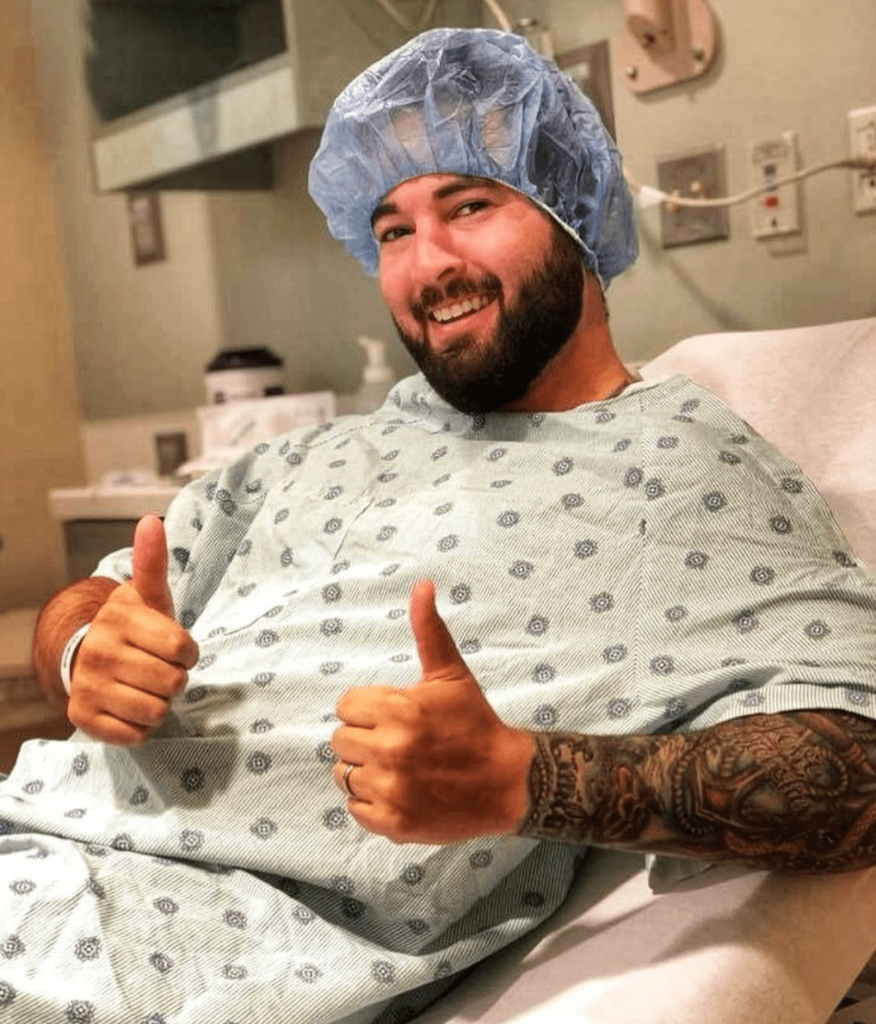
Do you remember waking up from the excisional biopsy surgery?
Waking up I remember taking my very first breath of just like this fresh, crisp, oxygen air, and I immediately noticed that I had a drain coming out of my neck. I had this sort of bulb thing that was collecting reddish fluid resting on my chest.
I knew that that was going to happen, but it’s supremely different when you feel it on your body. I think that that was a really interesting experience for me.
That’s where a little bit of the fear set in about how serious this really was. Up until this point, I was just going through the motions of what I needed to do, because that’s what we’re conditioned to do as human beings, get from point A to point B. That was my focus so that I can move on.
It was challenging, all of it. The whole waking up with this piece of me missing from my neck, knowing that I had it done, but I’m going to get the results of a test that’s going to define the rest of my life if I let it.
I had to make a decision in that moment as to which way my next step is going to be. Is it going to be forwards? Is it going to be backwards? Or is it going to be lateral?
Your surgeon’s bedside manner relieved a lot of your anxiety about surgery
I had supreme confidence in him. Specifically because before he really said anything to me, when he walked into the room for the very first time when I was meeting him, he actually picked up my son, Levi, gave him this huge hug, held him in his arms, and then sat down in the chair, shook my hand, said, “I’m Dr. Ahmad. Great to meet you. Is this your little boy?”
That just lit up my soul. I knew that this man, this physician, this surgeon, was in tune with my energetic frequencies and what I needed from a practitioner, and he totally over-delivered on that.
Going into his operating room (OR), I was nervous, but I was confident that I was going to come out again with some form of an answer as to what we needed to do next to get me back to feeling the way that I would like to feel.
The way that I deserve to feel. The way that we all deserve to feel. Everybody wants to jump out of bed in the morning and that’s what I miss the most. That’s what I struggle with the most.
When did you get the official diagnosis
That was July 11 and ten days later I found out that I had papillary thyroid cancer that had metastasized to my lymph nodes. That was a shock because not only did I have cancer, a lot of people like to tell you, “Well, it’s the best kind of cancer.”
It is never the right thing to say. Cancer is still cancer. I had a lot of feelings around that.
When that all hit, that’s when I was able to finally break it down and go through the emotions, which I’m still dealing with as anybody in my situation would. I have this cancer now.
How did you process the diagnosis
I think there were two moments where it became real and where it became more real. The first moment where it got real is I had to call my parents. That’s where it got real. Then, I had to tell my kids and then it got realer.
The 30-year stats of survival of thyroid cancer, you know, are 95-percent. The odds are so good, but there’s always that chance that there is another plan and you may be, I may be taken away.
To think that I am just getting the opportunity to be a dad for the first time and really enjoy it and be blessed to have the opportunity to be home full-time as an entrepreneur and never miss a moment, it makes you wonder sometimes why things happen in life.
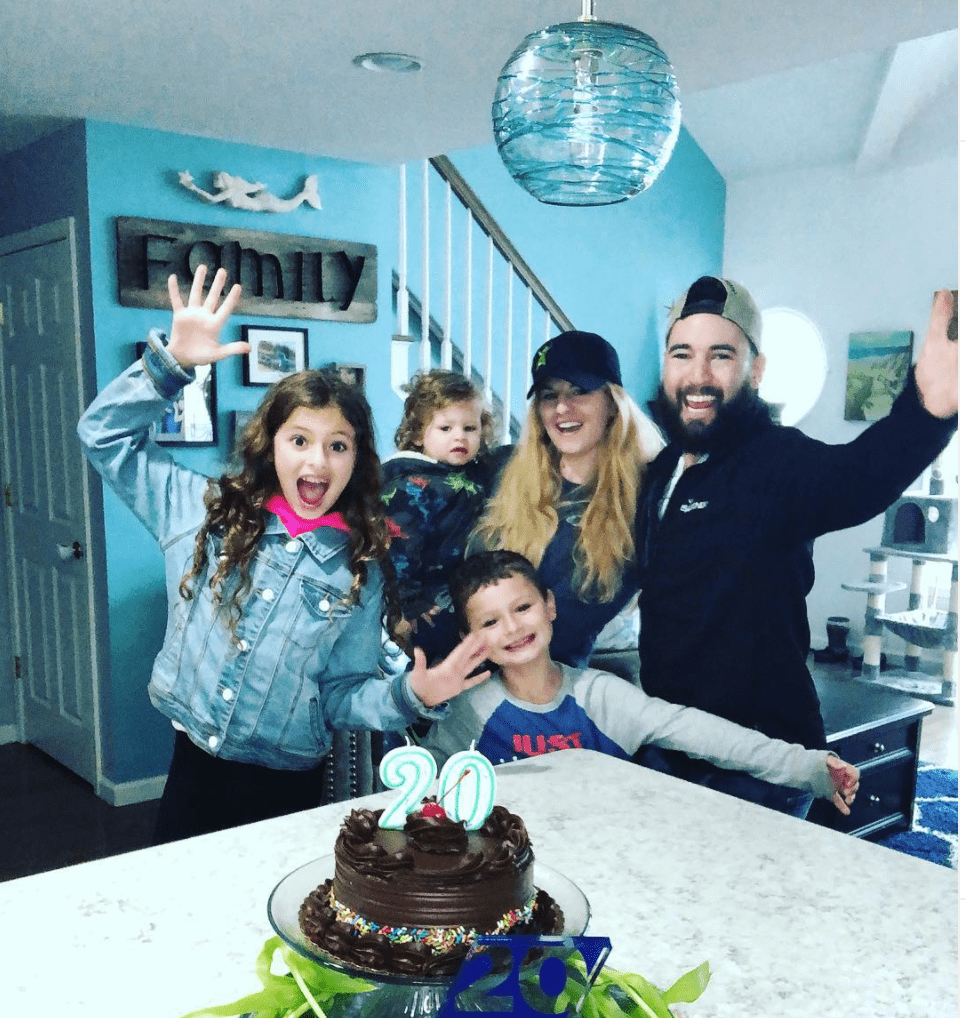
Did that happen? Was I given that opportunity to be an entrepreneur, to help people, to be at home full-time so that I’d have more time with my kids because my time on this planet would be cut short?
These are the things that I think about. It’s hard not to think about it. These are the glaring questions that stare me in the face. That’s as real as it gets.
Those were the moments that everything changed, when you have to be rigorously honest with yourself and everybody around you.
That’s what is happening. I think that is probably what each and every one of us who are going through this journey probably struggle with, is being honest with ourselves. I think that defines the journey for some people.
How did you break the news to your loved ones
In any situation giving anybody that information, you have to make a choice. Is this about me or is this for somebody else? In every other instance in my life, I will always choose to do something for someone else so that they understand that it’s not being done to them, but it’s being done for them.
This was one of the only instances in my life that I had to say, “Okay, I have to do this for myself.”
So many of us try to bottle them up or go at it alone and that’s where everything just snowballs. I’ve seen such a difference, not only in myself since sharing my journey, but the difference in other people, in them opening up about how long they’ve been following me since even before thyroid cancer, since before the diagnosis. I’ve learned a lot about that.
I think that it’s something that will be uniquely personal and individualized to each person who is going through this, but somehow, some way, you have to find the strength and be rigorously honest. That means checking yourself. That means going through the checklist yourself of, “Well, how do I want to say it?”
You don’t want to do it on the phone. You don’t want to be insensitive in your delivery, right? You have to show compassion. You also have to be clear on are you looking for empathy, are you looking for sympathy? Are you looking for anything from somebody?
When you tell people this, they’re not going to know how to react. Most people are really shocked. Sad people will burst into tears. You’ll get crazy reactions. You’ll get people who will laugh because they’re uncomfortable.
That’s what people do sometimes, they check-out and they laugh because they’re uncomfortable. That’s perfectly fine. You, as a person who’s delivering the negative news, has to be prepared with how you’re going to respond, no matter what reaction you receive from sharing that information. The most important part is being rigorously honest with yourself.
»MORE: Breaking the news of a diagnosis to loved ones
Total Thyroidectomy
Describe the transition going into thyroidectomy
The next phase was to have a swollen thyroidectomy because that’s the standard protocol for thyroid cancer. I obviously agreed for reasons that I was going to be cured or I thought it was the right thing to do. I still think it was the right thing to do.
How did your doctor describe the total thyroidectomy and after effects
Surgeons are usually pretty cut and dry in terms of their delivery. Now, my doctor is a supremely special human being but again his objective was to take the thyroid out and it was as simple and clean as that.
The follow up questions about how you’re supposed to feel, how I was gonna manage medication, really came from endocrinologists. But my doctor from the beginning definitely offered consolation and guided me through what was gonna happen, but not telling me, “Well, you may feel this way, you may feel that way.”
It was like “I’m gonna take your thyroid out and you’re gonna be on Synthroid for the rest of your life but your endocrinologist is gonna manage your dosage, they take your blood and look at your levels and this is what we’re looking for.”
So he did explain, but again, because I asked questions and expressed the interest in wanting to really understand. I don’t know that that is being done all the time, but I would hope so.
How long between deciding to do the thyroidectomy and the actual surgery
It was very quick. So the incisional biopsy happened on July 11th. Ten days later I found out that I had papillary thyroid cancer and in a couple of days I was scheduled to have a total thyroidectomy in August.
So it was just about six weeks in between diagnosis and having my thyroid removed.
That being said, my doctor wasn’t in a rush. He didn’t rush me to do this. This was the decision that I made. As a family we had this big vacation planned to Jamaica in November so I didn’t know if I was going to need the radioactive iodine or not, so me being the planner that I am I was trying to make sure, “Well, I don’t want to ruin my vacation. Maybe we can just wait until after.”
I ultimately ended up deciding I don’t want this thing growing inside of me. I’m getting this thing done and I’m gonna be fine to go to Jamaica. And I was.
Describe the pre-surgery ultrasound
Leading up the surgery I did have an ultrasound and I believe I also had an MRI done.
The ultrasound of your neck is a diagnostic tool that physicians are using to look at – let’s call it – your geographical topography inside your neck. They’re looking to see what the vasculature looks like, they’re looking to see lymph nodes, they’re looking to see what they can see.
Granted an ultrasound it is limited, but it is able to give them characteristical knowledge as to what’s happening. It’s going to help them paint a bigger picture, help them make a plan as to which lymph nodes are suspicious. It helps them with their surgical plan by identifying these things before.
It’s a non-invasive procedure. It takes about 20 to 30 minutes. You’re laying on a table. It’s very similar for anybody who has had a baby getting an ultrasound of your belly. It’s the same thing except they’re doing it on whatever area they’re looking for. For me it was my neck.
They do a whole scan, take pictures, put it on a CD, and send it to the doctor. You just feel a little bit of pressure. It’s nothing to worry about. It’s the waiting for results part of it that is the worst part but the exam itself is easy.
What were the ultrasound results
That ultrasound only showed the suspicious lymph nodes or mass that they saw that was actually protruding. I believe they only identified one.
What my doctor eventually found inside was actually more than what he saw on the ultrasound so again it’s only a guide. It’s only meant to be a guide to get them a better idea. But it helps people landscape so they know what obstacles they might come across in surgery.
Describe the prep before the total thyroidectomy (surgery)
The night before you can’t eat anything or drink after noon. My surgery was going to be in the morning and I’d have to be in the hospital for a couple of days.
There was some mental prep that definitely went into it. I tried a lot of mindfulness, I listened to podcasts just to keep my mindset in a positive space where I can not get wrapped up in everything.
Probably the most stressful part of getting to the hospital was just navigating the parking lot, parking the car, getting out of the car, and walking in.
That’s the hardest part. Because you walk in those doors and somehow someway some aspect of your life is about to change and it didn’t even hit me that I was literally about to have a piece of me removed from my body and it was no longer gonna be mine and so my wife put it in perspective and that was really interesting for me.
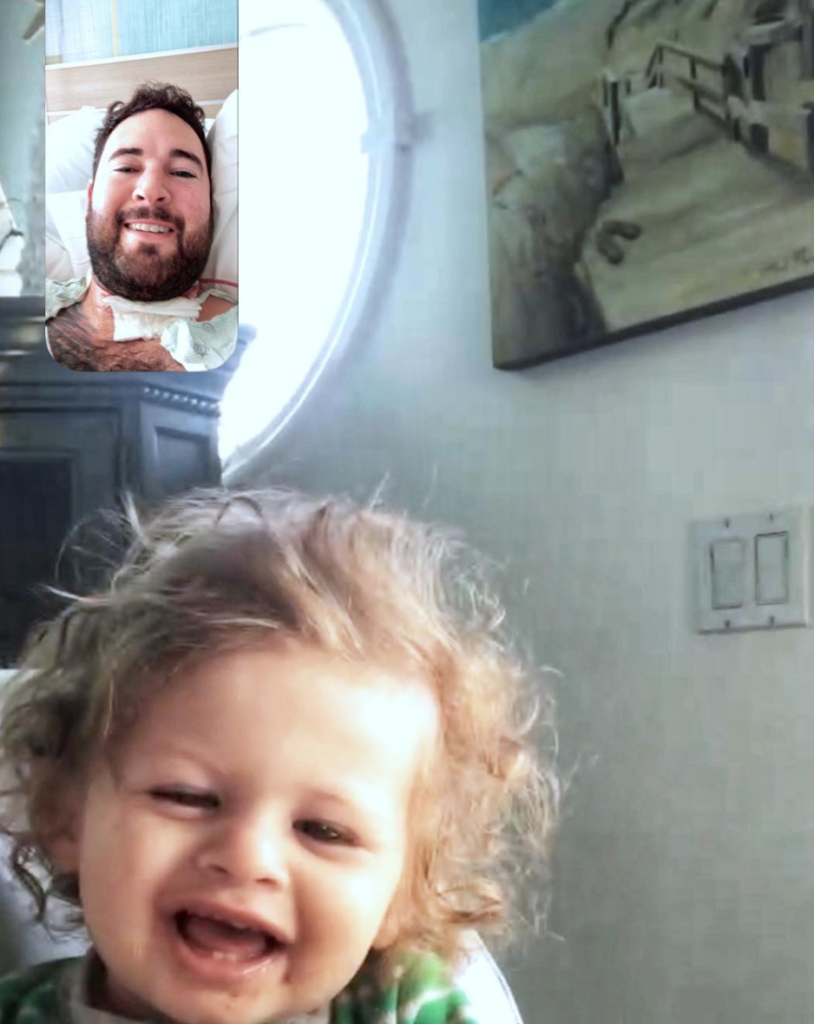
Walking through the doors I remember they guided me to a large reception room where they call you in to do your initial registration, you get your insurance card, and then they send you up to the pre-surgical area which is again another waiting area where anybody, any family members who are waiting for somebody who’s having surgery are waiting. From that point they will bring you back to a room.
I don’t think I actually had to wait that long. I forget what time I had to be there in the morning but it was pretty early and they brought me back pretty quick. They got me hooked up.
I was probably back there for about an hour-and-a-half maybe chatting with the nurses, doing my personable thing and just laughing and trying to bring good spirits to people because people are nervous. When I’m nervous I try to tend to focus on making other people feel better cause that makes me feel better.
So that was my method for that and then I just remember them telling me, “Okay, it’s time to go. Put on your surgical hat and let’s do this.” And that was it.
I remember being rolled to the OR, I remember it being cold, I remember making jokes before they put the mask on my face and I remember going to sleep. I remember waking up and you feel a little bit confused, you’re not really sure where you are.
Then you have people who are there when you were actually awake for the first time but the anesthesia hadn’t really worn off and you say all sorts of really funny stuff!
What do you remember from waking up
What was really refreshing is they made me laugh when I woke up. They went through their process. “Say how your pain is.” I think I was in recovery for about an hour or so, maybe two hours. I was definitely, I’ll be honest, I was in pain. It didn’t feel good.
That again comes down to being honest. Don’t be a martyr in this situation and if somebody’s asking you how your pain is, be honest. Don’t suffer. We’re already going through this journey and it’s hard enough.
Recovery from surgery
I didn’t know that this part of my journey, meaning the aftermath of having a thyroid removed, was going to be the hardest part. I thought the surgeries were going to be the hardest part. I thought it was the physical manifestation of difficulty.
What I’m learning now is that it is the journey afterwards that is the hardest part. It is when you have time to sit with your feelings, sit with your emotions, and your mind has the opportunity to get the better of you if you let it.
What were the surgery side effects
- Major fatigue
- Developed anxiety
- Sweating
- Feelings of hot and cold
- Mental fog
The side effects have been a whirlwind and have really been the worst part. It’s the aftermath of not having a thyroid for me that has been the most difficult adjustment that I’ve had to make.
Since having my thyroid removed I have fatigue every single morning. You’re talking to somebody who literally used to jump out of bed at 5:30 in the morning with tons of energy, ready to take on my day, and now I have significant struggles with that. It is really hard and it’s not who I was.
I’m having trouble realigning myself with the discipline to get back to my routine or showing myself grace in that it’s okay to not be the same person, to not get up at 5:30, to not jump out of bed with energy in the morning. That has definitely been frustrating for me.
On top of that I seem to have developed anxiety which is not something I’ve ever had to deal with really in my life before. I’ve had as many panic episodes as any person would in a difficult situation where you’re in that fight or flight mode. We’ve all been there where we’re scared and you go into anxiety. That’s what we do. We’ve all experienced it.
But since this surgery, I have anxiety multiple times every single day to the point where I’ve noticed myself taking really deep breaths. I’m finding myself trying to cope, trying to calm down often, and when you couple that feeling with palpitations which trigger the anxiety again is leading to this uncontrollable sweating and feelings of either being really cold or really hot.
Now I have really clammy hands all the time and it’s disgusting and I’m self conscious about it because I constantly notice my hands feel cold, my feet feel cold, my armpits are sweating, but I’m hot and what do I do about it?
My wife will laugh and tell me I’m a hormonal pregnant woman and she says it lovingly you know, but this is a real struggle. This is again, a defining characteristic. I think about me being a businessman and an entrepreneur.
I’m shaking hands with somebody and having clammy hands and what that person must be thinking. Am I now in a position where I have to defend and justify my clammy hands because I have cancer? Nobody wants to have that conversation.
»MORE: Read more patient experiences with surgery
Post-Surgery (Total Thyroidectomy)
Describe waiting for all the test results
It’s agonizing going through this process. It is absolutely agonizing. What makes it worse is if you’re your own advocate and you already [have] access to electronic medical records.
You already know that the results always get there first for the most part. And you have to make a choice. Do you want to look at it or do you want to wait?
I’m the type of person, I always need to know so I always look at it and I knew before anybody really confirmed and told me for certain in person that I had cancer.
Just from a very recent experience as I’m going through it right now, I’m currently waiting for my endocrinologist to call give me updates about my ultrasound that I had done on Monday that I already know the results of – after my thyroidectomy I still have residual tissue in there which is normal after a thyroidectomy. But they found five possibly suspicious nodules which means that my journey is now taking another turn.
At least I’m getting some clarity. I’m getting some answers. I’m moving in the right direction.
Now it looks like I’m going to be having the radioactive iodine ablation, which is something that was [passed on by previous doctor].
So this is the spectrum of medical professionals. You have two people in the same field, in the same specialty, with most likely the same education having two totally different opinions based on the evidence that I have. As a patient, what do you do with that? And feel about that? And deal with all of that? That’s the part that I’m dealing with right now.
How long did it take to get results from the thyroidectomy?
Once I had the thyroid removed I was in the hospital for a little more than two weeks. One of the things that people tend to worry about is vocal cord paralysis which is a real. That’s something to be concerned about which is why it’s important to ask the questions to your surgeons to make sure that they are skilled enough to be doing this.
Another thing that people are concerned about when it comes to having their thyroid removed is damage to the parathyroid gland which is a major component in controlling calcium levels.
These are things that people rightfully should be worried about [so] you should ask questions. There are complications that can happen, you should be informed about them.
What was your reaction learning the actual thyroid didn’t have cancer?
When I was in the hospital I didn’t know that the thyroid didn’t have cancer. Ten days later I got the report that said that they didn’t find any evidence of cancer in the thyroid.
That weight of just not knowing was hard.
It was pretty cut and dry. I remember the surgical team coming in to check on me, checking the incision, checking the drainage. I remember the nursing team coming in numerous times throughout the night and the day to take blood and give me meds and check my calcium levels and all that stuff.
And then I remember the endocrinology team coming in and saying, “Okay. The thyroid’s out so we’re just gonna figure out what your dosage is gonna be for Synthroid. You’re gonna come and see us in the office and we’re gonna take blood every six weeks and monitor your levels to figure out where you need to be.”
That’s pretty much the process and you’re on this medication and that’s that.
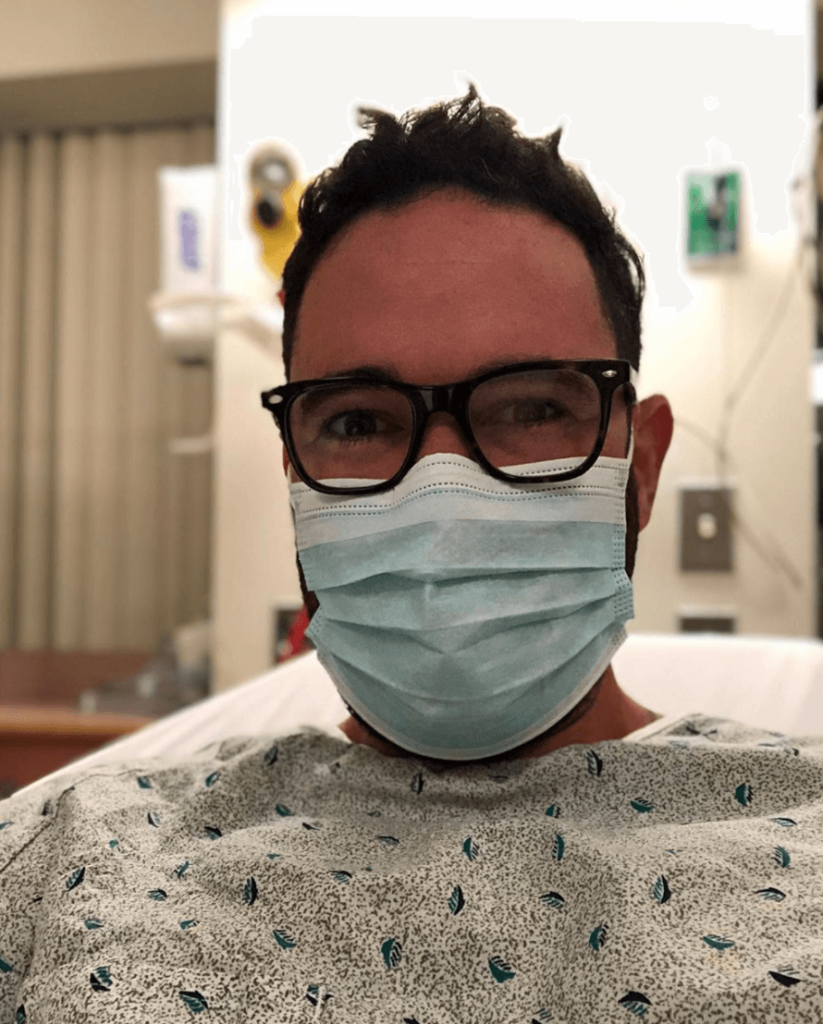
The results (or lack thereof) were the toughest part
It’s hard to talk about for me because I’m still in this process of not having any closure because upon pathological examination of the thyroid when I did have it removed was that there is no cancer in my thyroid. There were no lesions, there were no markers of anything wrong other than that I had this papillary thyroid cancer that was confirmed upon pathology when they removed the first lymph nodes.
The mental recovery has been tougher than the physical one
So that has been challenging and before this I was a really high-functioning person. I still am but I had an incredible memory. I remember the details of peoples faces, what they were wearing, what they were doing, I knew their names, I knew their family members.
At one point in my life in high school I knew pi to eighty-one digits so my memory was always crazy. My family always tells me I remember the wildest things from when I was a kid.
Now I’m really suffering from brain fog and I’m struggling with my memory. My memory recall I’m definitely having difficulties with and for me this is causing an identity crisis which is causing more anxiety for me because I’m literally in the process of becoming this new person and every day I’m faced with a choice.
Am I going to be happy with the person that I am today? Or am I gonna keep trying to get back to the person that I was yesterday? And I could go off on a million different tangents because that’s a multi-pronged approach. Maybe physically I might be able to get back to where I was. I might be able to get a six pack again but will that mental clarity return? I don’t know.
One of the glaring questions that I deal with every morning is, Who am I going be today? Am I gonna be the person who is gonna struggle with the memory recall or am I gonna be the person who says this is just a challenge that I’m having right now as a result of cancer and any minute my thought will come back to me. If it doesn’t I’ll get back to you as soon as it does.
It takes patience to get through
Part of this journey is understanding that you can’t always go forward. You’re not always going to go backward, and sometimes it’s okay to go sideways. It’s okay to make that lateral move.
Showing ourselves grace through this process, that’s been a huge part of my journey because I am not the person that I used to be after having the excisional biopsy.
I’m not the person that I used to be after having the thyroidectomy. We change as people as we go through this process and embracing that new person has to be a part of this.
How was the Synthroid?
My frustration really started at that point in the journey because that’s where a lot of the symptoms really started to pop up and I was on a really high dose of Synthroid. I was on 175 micrograms in the beginning. The thing about Synthroid is that when you take it, it requires at least six weeks before it really changes the levels in your blood.
So imagine every time you have to change a dose because you’re having a symptom that is popping up it can take six weeks before the levels are adjusted. So again we’re talking about this waiting game that we have no control over.
When you have a physician who isn’t listening the way that you’re looking for and is telling you that more than likely this is the best that you’re going to feel for the rest of your life, that’s when you have to ask yourself, “Is this what I’m willing to settle for?”
My answer was no and that’s what led me down this hole of asking questions and finding specialized specialists who will only deal with this type of disease. I think that that is probably the most important thing.
Pushing for More Answers

At what point did you decide to push for more testing?
My frustration and being unwilling to settle for feeling like this all the time for the rest of my life led me to asking questions.
- Why didn’t my first endocrinologist do an ultrasound to see what was left if anything was left, if anything could be identified?
- Why didn’t he do a whole body scan to see if there was any sort of cancer left anywhere in the body?
- Why wasn’t I given the radioactive iodine knowing that successful thyroid surgeries almost always leave residual thyroid tissue?
- Knowing that radioactive iodine is going to kill it?
- Knowing that I have this rare form of papillary thyroid cancer that wasn’t in my thyroid? Why not? Why wasn’t I given this?
- Why were we so sure that they got it all?’
That’s what led me to having the tissues reexamined, to finding another endocrinologist to ask more questions, to find somebody who was willing to ask the same questions that I was asking myself.
Six months down the line I am not feeling good every single day and you’re telling me that my levels are optimal for where they need to be when treating this type of cancer but nothing’s getting any better and this is the best I’m gonna feel? I don’t think so.
So the pathology was re-tested and then they had this ultrasound that was ordered by my new endocrinologist. The new endocrinologist also just ordered the radioactive iodine. So it looks like that is going to be the next step. I’m waiting to hear from him but I ended up in this position getting the second scan because I wasn’t afraid to ask a few difficult questions and challenge the professionals.
How has it been dealing with additional medical questions on your diagnosis?
I’m frustrated with the entire process of having this confirmed medical anomaly rare disease. I don’t even know what it’s called. I have confirmed metastatic disease, but there’s no primary [site]. I forget the terminology that they used from like an ectopic thyroid similar to an ectopic pregnancy on the outside of a fallopian tube.
They’re saying that there could have been a piece of thyroid that dislodged. Or when you’re born and you’re growing as a baby the thyroid moves down your throat and residual tissue could have rubbed off and for whatever reason that area had cancer.
The other possibility that they offered was that this was basically just a cancer cell that completely took over a lymph node. Unfortunately it seems like I’m never going to get that answer.
I think I have to work on moving past the frustration of not having the answers and into acceptance of what I do know and coping with the new person that I’m in the process of becoming as a result of this journey.
You had to continue to advocate for yourself in treatment decisions
That’s where I’m at now. Working with my now second endocrinologist, I had to switch to find the right fit. That is incredibly important for anybody that’s going through this journey.
You have to be your own advocate, you have to ask questions, you have to be prepared because this journey is difficult and doctors have that effect on people where you have all these questions and you forget what you need to add.
Be prepared, write down your questions, be your own advocate because nobody else is going to do it for you. Fortunately, that is something that I’ve learned from being in medicine.
Navigating that was difficult, getting myself in to see the best of the best in the United States so that I could get some of these questions answered.
»MORE: How to be a self-advocate as a patient
Because here I am now six months close to my thyroidectomy, I’ve been told, not by one major cancer institution, but now by a second major cancer institution because I had the pathology reexamined, they confirmed that I did have papillary thyroid cancer in lymph nodes, but I did not have thyroid cancer in the thyroid gland itself.
So that brings me to this stage which is trying to get some answers, trying to find people who help and answer the questions that I have.
Work & Finances
Were you able to work through treatment?
Working through cancer is something that you can absolutely do [with this diagnosis]. The beginning process was good. My hospital was tier one with my insurance.
You have your deductible your initial out-of-pocket that you have to meet. If you haven’t met that for the year, you’re going to incur that cost whether you’re getting any type of treatment or surgical intervention. Be prepared for that.
»MORE: Working during cancer treatment
How was dealing with insurance
Insurance is confusing, ask questions. The hospital has those financial representatives to arm you with the information so that you can best understand it and it can be broken down.
Take advantage of it, don’t just push it off until one day you get a bill in the mail that surprises you. Don’t let that be you.
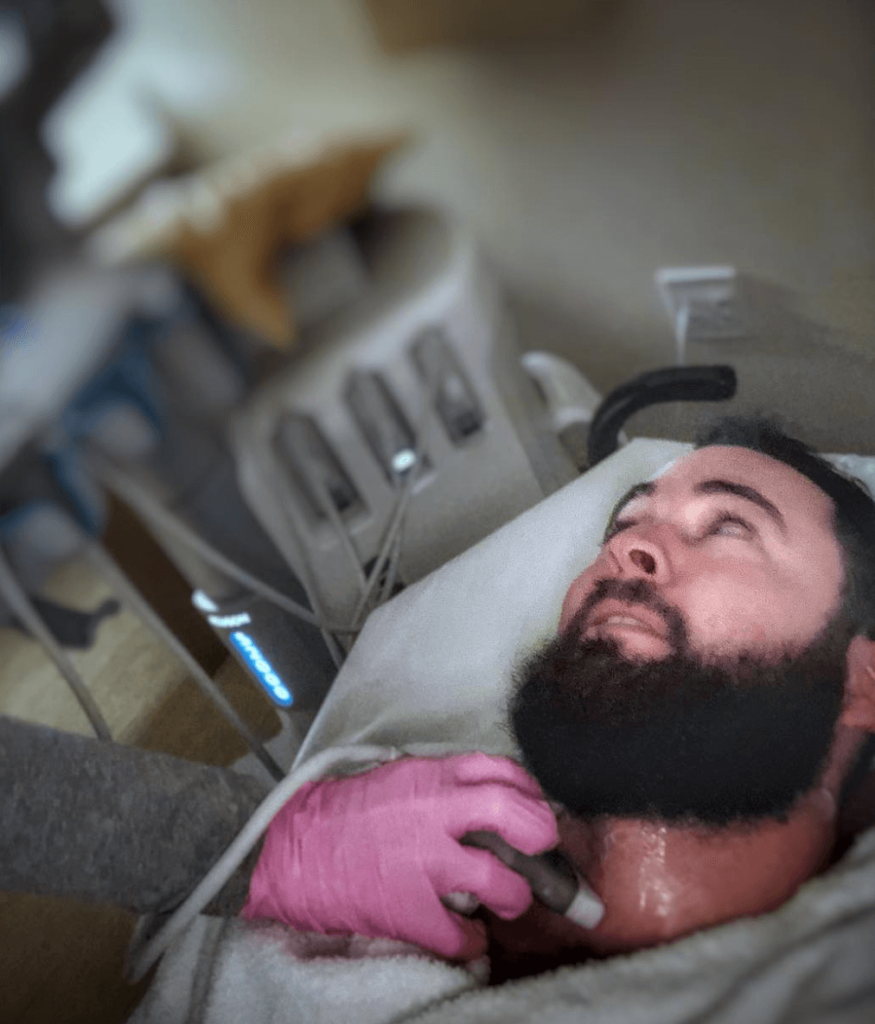
University of Pennsylvania turns out is tier two, which initiates a whole other level of deductibles with my particular insurance.
Realistically I don’t think financial aspects really ever go smoothly. A lot of instances in these cases people have anxiety around money in general. It can be daunting.
So again, asking the questions to anybody you can, at any part in this journey so that you have the most information, will be really important. I asked the information when I was looking to get into University Pennsylvania.
But remember how I just said semantics – it is everything. I asked, “Are you a network with my insurance?”
The response was yes. But the question should have been, “Are you tier one or are you tier two?”
We’re fortunate enough to be in a position where we can afford this treatment. I am blessed and I am grateful beyond belief to be in this position, but not everybody is.
So don’t make that mistake. Make sure you’re clear when you are asking exactly what you’re looking for. If you don’t get the answer that you need to make the decision, ask again, ask in a different way.
Support & Relationships
How did you deal with the mental and emotional stress
I firmly believe in mindset over everything and that if you’re positive in your mind, you can overcome anything and you can go anywhere. That’s in your mind.
I also firmly believe in not having bad days, but having challenging moments or obstacles because those are meant to be overcome. I don’t know about anybody else, but I know that I was given this mountain simply so I could show other people that it can be moved. I have no qualms about that and that’s why I’m so vocal.
It was hard to find other male thyroid cancer patients for support
I’m grateful for the opportunity to share my story and talk about thyroid cancer because it is not something that is regularly diagnosed in men. In fact, it’s three-to-one in terms of women being diagnosed to men. That’s a really interesting statistic. Only 25-percent of men.
So we have to get this out there. We have to talk about it and navigating the healthcare at the same time, I couldn’t scream front of the rooftops about how important it is just to be your own advocate and ask the questions.
It’s important to find your “cancer community”
Absolutely. When it comes to finding your community, it is about surrounding yourself with people who understand how you feel, why you feel that way. It’s about acknowledging that we do have these feelings. We do feel safe. Acknowledge that. Accept it. Embrace it.
Talking about your symptoms, your diagnosis, your tests, and whatever else that you’re dealing with in your particular situation, whether it’s how you’re dealing with your family or how the interactions with your kids are, there’s somebody most likely who’s been through what you’re doing.
If there’s anything that I learned in life in the last five years that has undoubtedly transformed my life, it’s when you want something or when you want to do something you require finding someone who has what you want, or who knows how to do what it is that you want to do.
It may require copying that because the results, they’re already there. But you have to learn the skills, the habit and the mindset to get you to that point B. You have to understand that.
This journey, like anything else in life, isn’t just about going through the process, but growing through it. Not just going through it, you have to grow through it. You have to evolve, just like us as humans. We have to evolve.
Find your community where you can interact, where you can connect with at the very least one other person who shares your perspective.
I guarantee you it will make you feel better particularly because you’re more likely to tell a stranger something, like a secret or about how you really feel, whether it be about your diagnosis or about your family, or your lack of support, or whatever it may be.
You’re more likely to tell it to a stranger than you are to someone who’s close to you.
Sometimes letting go of those burdens, it’s freeing. I can’t be more of a proponent of being interactive in the communities. When I first joined a couple of the Facebook groups, I didn’t want to share my story. I didn’t want to be one of the “complainers” and I realized it’s all about perspective.
It’s simply a perspective switch. Are these people really complaining or are they using it as an outlet to share their experience so that others can learn? That comes back to being so humble that you become invisible or being helpful, and sharing your story.”
It’s okay when you first get involved in a community to sit on the sidelines and watch other people post, and read, and take in all the information. When you’re ready, and there will come a time when you are ready to share your piece, do it.
Interact with people because you have something. You have an experience that other people are looking to gain insight on. I ask myself the question, ‘Who am I to withhold that information from somebody who’s seeking it?’
Somebody wants to know what I went through, why shouldn’t I tell them if it would make them feel at ease, if it would make them feel a little bit better, if it would give them some clarity on their journey. My only job is to deliver value here.
That’s what I’m realizing and that’s what a community offers, is value. Value among anything else is what you’re gonna get from a community. Value and relationships. I think those two things, they’re some of the strongest predictive factors in helping us navigate this journey, helping us survive. It’s there for the taking, why not?

How did the diagnosis impact your relationship with your partner?
My wife has been my rock. She actually knew that I had cancer before I did. Our surgeon actually told my wife when he came out of the operating room that he was 90-percent sure of what he saw.
When my wife, Jess, eventually told me that, I knew right away because no doctor is going to go out on a limb and say something like that without knowing. You just don’t open yourself up like that. I had a couple days really to prepare before the final report came out.
But she has been my rock. She has been my strength when I’ve been weak, she’s been my shoulder when I’ve needed a place to rest.
She has given me the ability and empowered me to focus on myself and focus on my care so that when I am showing up for our family and for our friends and for our business, that I am showing up in my best authentic self and not someone who’s crying for help or was struggling more so than necessary.
She’s really empowered me to make this journey, make my healing the center of our world, so to speak. I couldn’t be more grateful for that, to have found someone who embraces the tough times.
She’s guided me the whole way, just in terms even of getting information when I was too tired to do it myself or I don’t want to make phone calls, I don’t want to be on hold with the insurance company. I don’t want to deal with those things. She would step right up and do that.
Support during this time is pretty much one of the only things you need because you can’t do this alone. Don’t think that you can. You can’t. I can’t.
»MORE: 3 Things To Remember If Your Spouse Is Diagnosed With Cancer
How did you tell your kids about your cancer
Our daughter is eight years old, our middle son is six, and our youngest son is 21 months. It’s a pretty good range, but they don’t understand. I can’t expect them to.
Their nana actually had breast cancer, so this isn’t their first rodeo, but they were a little bit younger and she’s since doing okay, so they only understand the cancer as maybe I’m not feeling well or I’m a little bit under the weather today.
I tell this a lot when I talk to people: kids who get cancer are the most resilient people in the entire world because they haven’t been conditioned as an adult or any other person walking this planet to have fear of the big C word, like we all do. You hear cancer and you get scared.
Kids are fortunate enough to not have been programmed that way. Cancer is obviously terrible. Kids with cancer is even worse.
But there’s a reason that I would like to believe that they are resilient as they are, and that is because they are operating from a place of love and a place of joy and a desire to live versus becoming victim to the fear of the unknown and what is being held for you in the future.
»MORE: Parents describe how they handled cancer with their kids
Survivorship has brought its own struggles
I think that is something that everybody who is going through this journey has to learn. Living with cancer is a real thing. It’s a real thing and you have to learn how to do it just like you do anything else in life.
You have to learn. You have to be willing to learn. You have to be open-minded enough to understand that things are gonna be different.
That right there is what makes the journey as hard as it is because it’s not black and white, it’s not cut and dry, it’s not all of a sudden I have cancer and my entire life changes – it’s a slow process of becoming that.
It’s a process of manifesting what we’re actually creating and putting out into the world because essentially we do create it. I create it. I create my own reality. So understanding that, owning it, snapping out of it and doing this, talking about it – that’s what you do to move forward.
Last message to people dealing with a diagnosis
Just know that you are not alone and you are not going through this by yourself.
There are people around you, people near you who love you and support you, who only want the best for you, who want to see you smile, who want to see you laugh, want to see you experience all the things that this life has to offer.
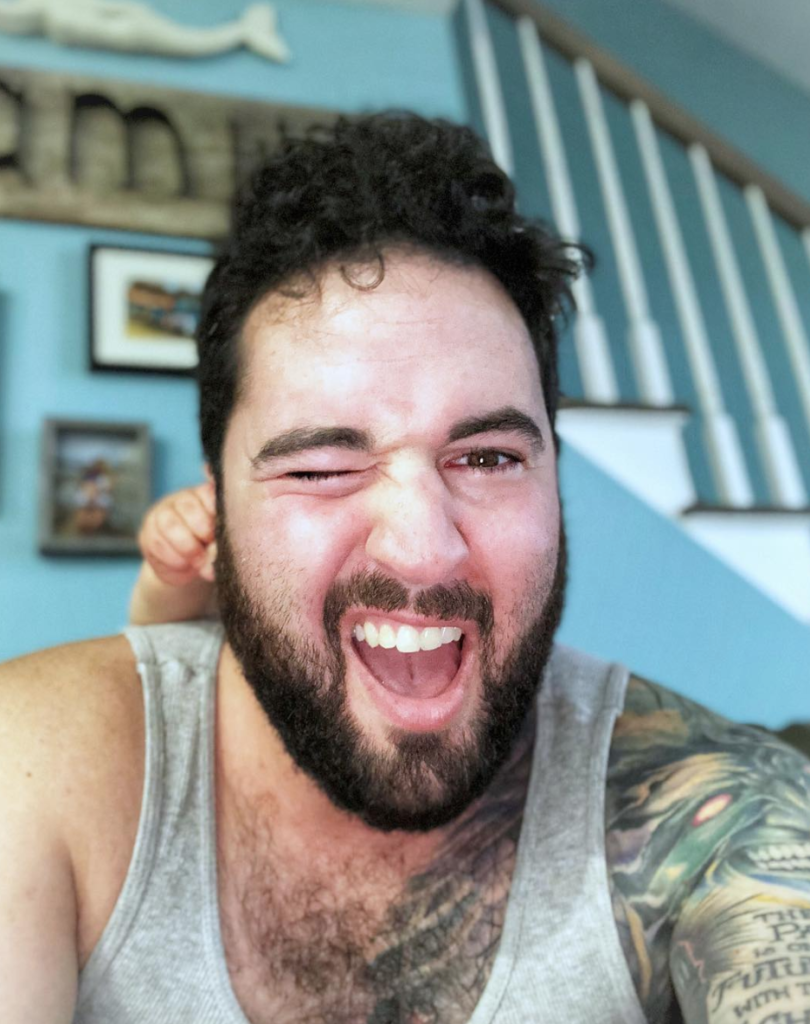
The only person that is going to take away that opportunity, the only person that’s going to stand in the way of you getting to do those things and enjoy the little things in life is you, because you have a choice, right here, right now, to decide how you’re going to deal with this.
Are you going to wake up every day and feel sick and feel bad for yourself? Are you going to wake up every day and feel sick and feel guilty about the things that you’re missing or the things that you can’t do?
Or are you going to wake up every day and feel sick but put a smile on your face, acknowledge the emotions, but find something that’s going to switch it for you?
Are you going to wake up every morning not feeling well and decide:
Today is the day my story of sadness ends. Today is the day that my story of guilt is over. Today is the day that I let go of all those feelings that are holding me back, keeping me stuck in this place.
Today is the day that I decide who I’m going to be tomorrow. Today is the day. I decide when, I decide how, I decide why.
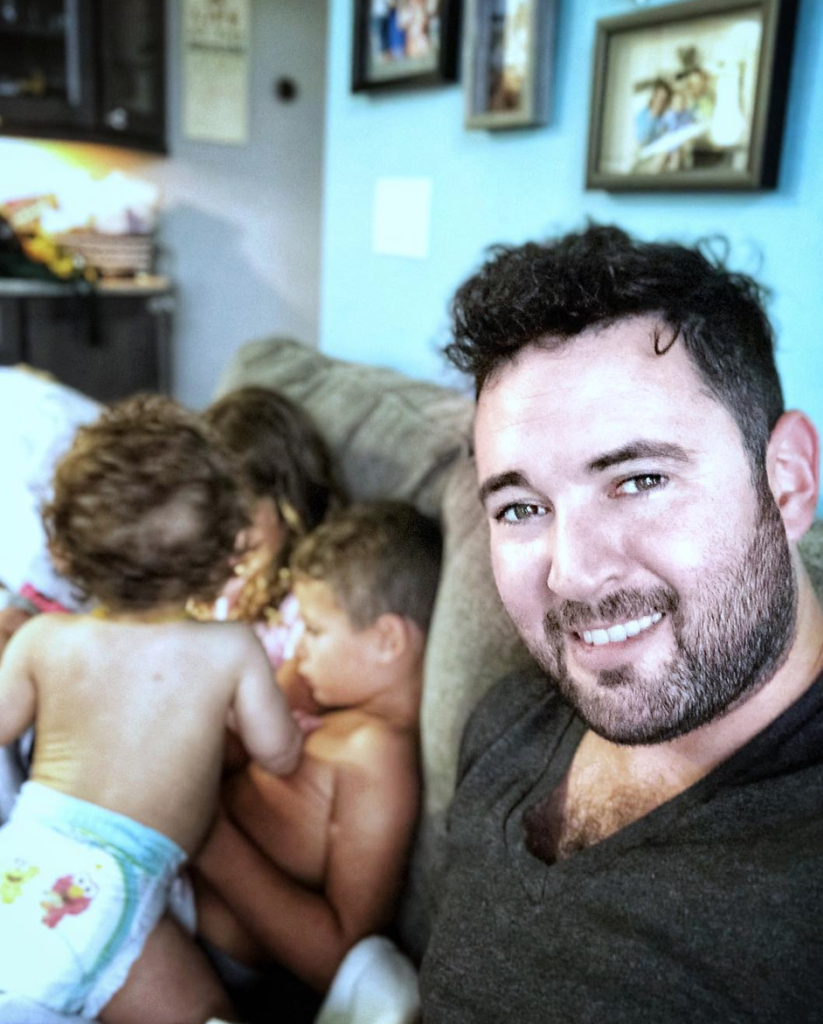
Inspired by Greg's story?
Share your story, too!
Thyroid Cancer Stories (Under 55)
Carmen Y., Papillary Thyroid Cancer
Cancer details: Most common kind of thyroid cancer
1st Symptoms: Swollen neck
Treatment: Thyroidectomy (entire removal of thyroid), radioactive iodine treatment
...
Jamie K., Papillary Thyroid Cancer
Cancer details: Most common kind of thyroid cancer
1st Symptoms: Difficulty swallowing, lump on neck
Treatment: Thyroidectomy (entire removal of thyroid), radioactive iodine treatment
...
Sarah J., Papillary Thyroid Cancer, Stage 1
Cancer details: Spread to lymph nodes
1st Symptoms: Enlarged thyroid
Treatment: Thyroidectomy (entire removal of thyroid), partial neck dissection, radioactive iodine treatment
...
Nancy, Metastatic Papillary Thyroid Cancer, Stage 2
Cancer details: Spread to lymph nodes
1st Symptoms: Lump in neck
Treatment: Thyroidectomy (entire removal of thyroid), radioactive iodine treatment
...
Greg S., Metastatic Papillary Thyroid Cancer, Stage 2
Cancer details: Spread to lymph nodes
1st Symptoms: Fatigue, lump in neck near Adam’s apple
Treatment: Thyroidectomy (entire removal of thyroid), radioactive iodine treatment
...
Jenna C., Metastatic Papillary Thyroid Cancer, Stage 2
Cancer details: Spread to lymph nodes
1st Symptoms: Hoarse voice, painful talking, lump in neck
Treatment: Thyroidectomy (entire removal of thyroid), radioactive iodine treatment
...
Lainie J., IDC, Stage 2, HER2+
Symptoms: Lump in breast
Treatment: Chemotherapy, double mastectomy, radiation
...
